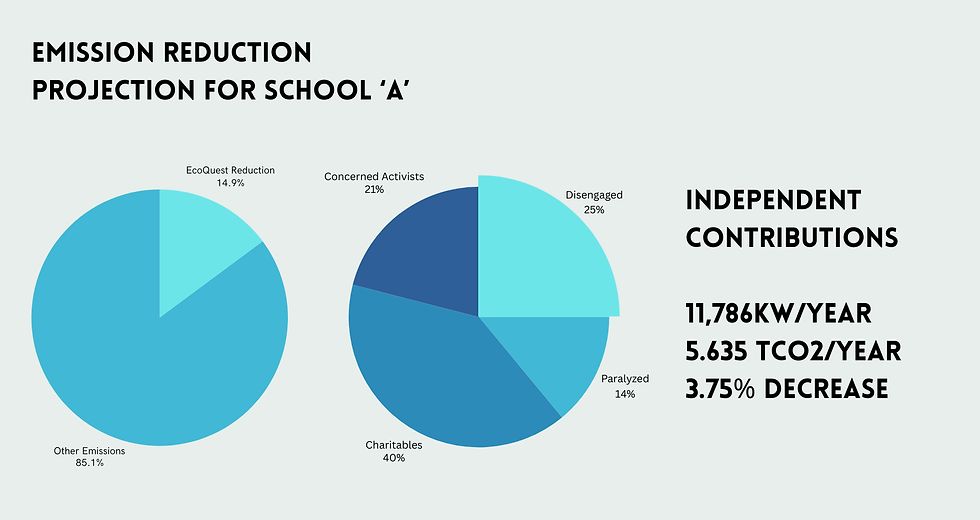
The EcoQuest Impact

1. Match 3 to Self-Eficacy
Students consider the power consumption of appliances to strategize and clear levels.
01
Students come across the inter-school leaderboard in the event tab. Their desire to perform better than other schools and earn in-game boosters motivates them to reduce emissions through low-stakes actions such as turning off the lights in empty classrooms.
02
At the end of the month, students see that their actions led to energy reduction and a higher tier. They realize the impact of their own actions.
03
Students feel more motivated to perform well in the inter-school leaderboard. They ask themselves, "What else can I do? What if I turn off other electronics I am not using?"
04
Students observe even further reduction in energy consumption the following month and earn extensive in-game rewards.
05
While repeating Step 3~Step 5, students realize their actions impact emissions and form self-efficacy.
06


2. Match 3 to Emission Reduction
Electricity Literacy and Carbon Emission Reduction
According to NetZero@School, carbon literacy education tailored to a school's emission patterns can cause a 17~20% decrease in emissions. The key behind this is self-efficacy.
Self-Efficacy and Carbon Emission Reduction
Self-efficacy interventions can increase sustainable behaviors by 19%. EcoQuest fosters self-efficacy by showing students their contribution to emission reduction both in-game through its scoring system and in real life from its monthly leaderboard.
In-Game Reward for Carbon Emission Reduction
EcoQuest harnesses its exclusive partnership with NetZero@School to build its proprietary feedback loop. In this system, students are rewarded in-game for their real-life reduction. The desire to perform well compared to other schools fuels the desire to reduce energy consumption in daily life through low-stakes actions. are rewarded in-game for their real-life reduction.
Demand Management in the Emission Reduction Picture
The IPCC 6th Assessment Report states that behavior and awareness change through demand management can reduces 40~70% of emissions by 2050. Moreover, demand management allows students to become the center of carbon emission emission reduction at their schools.
World's First Carbon Reducing Game
EcoQuest spins energy literacy to behavior change and habit formation. Engaging the disengaged 25% leads to a 3.75% independent emission contribution.

4. Effective Learning
Gamifying Energy Literacy
According to the Federation of American Scientists, students retained 90% of what they learned with gamification, compared to 20% from hearing information. Gamifying EE amplifies learning outcomes.
Daily Quiz : Spacing & Testing Effect
The testing and spacing effects delineate the effect of iterative tests on learning outcomes. EcoQuest's short gameplay and daily quiz functions enables users to foster energy literacy every day through gameplay and quizzes.
EcoQuest Proprietary Database : Self-Reference Effect
Self-reference effect states that students best learn when they connect learning material to their own lives. By conducting full-scale energy consumption analysis on actual classrooms, EcoQuest built a proprietary database that the gameplay is based on. Because the tiles that appear and points students earn in-game are based on classrooms, they connect to the material better.
Game : Self-Determination Theory
The Self-Determination Theory (SDT) states that students demonstrate the highest motivation when they choose to learn a concept. EcoQuest's enjoyable gaming model allows students to learn with joy.
Seamless Integration of Electricity Literacy
EcoQuest seamlessly integrates energy literacy into addictive gameplay. In doing so, EcoQuest enables students to repetitively reinforce the energy hierarchy without boredom.

3. Engaging Learning
Addictive Match-Three Gameplay
EcoQuest corroborated its student testimonials with extensive research on game psychology. EcoQuest designed its features based on game psychology principles to maximize engagement among the disengaged 25%.
Match-Three : Variable Reinforcement Schedule
B.F. Skinner's operant conditioning principles state that the variable reinforcement schedule (unpredictable rewards) engenders a dopamine rush. Based on Skinner's principles, EcoQuest made each level unpredictable : you sometimes get a chain reaction and large points when you match 3 tiles, and nothing much happens at other times.
Stages : Flow Theory and Endowed Progress Effect
Unlike its competitors, EcoQuest provides a clear objective that players work towards. The endowed progress effect states that people feel accomplished even with small wins when they see they are making progress. Furthermore, the flow theory suggests that gradually increasing level difficulty proportionate to players' skills best induces engagement.
Remaining Lives :
Loss Aversion
Loss aversion describes how people feel the pain of losing more than the pleasure of earning. This drives players to focus on each stage in fear of having to wait for their hearts to refill. This also incentivizes them to move to the Event Tab to solve daily quizzes for extra boosters.
Tier and Race : Competition and Intergroup Rivalry
A study by Chen et al. (2012) found that competitive game elements increase student motivation and participation rates by up to 90%. EcoQuest's inter-school leaderboard and episode clear races spark competition between school communities, which induces motivation to perform well in-game and change real-life habits.
.png)
Emission Reduction Projection
According to EcoQuest data, low-cost actions such as cutting standby power, and turning off an appliance during lunch breaks or after school hours can reduce energy consumption by up to 15%. When paired with NetZero@School's energy literacy program, it totals 47,141kW and 22.5 tCO2.
Independently, EcoQuest effectively engages the disengaged 25% and contributes to an extra 3.75% of emissions reduction.